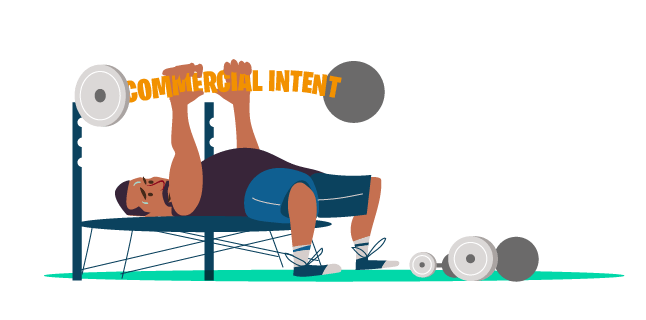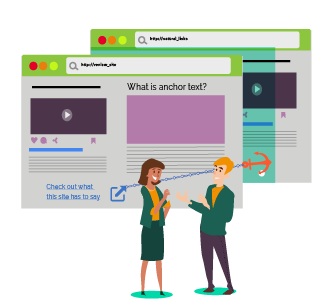Having valuable keywords with high search volume is helpful.
But they’re only valuable to your web conversions if they have commercial intent behind them. That is, people are searching with the intention of making a purchase – also known as transactional searches.
You could rank highly for a really popular search term like ‘trainers,’ and have hundreds of thousands of monthly visitors. But, unless you serve the purpose of your visitors, that traffic won’t convert into profits.
The key is therefore to find keywords that customers and buyers use to search.
With commercial intent, the different variations of keywords fall into four different categories:
1. Buy Now
People who search with the ‘buy now’ keywords are on the cusp of making a purchase. They are literally typing in their search with one hand, and holding their bank card in the other.

Examples of these types of keywords include: ‘buy now,’ ‘free shipping,’ ‘deal,’ ‘discount’ and ‘coupon.’
These valuable keywords, while different, all serve the same purpose. They aim to convince a prospective customer to take action by offering an additional incentive, like a discount or free shipping.
Though you may not want to offer free shipping and discounts to your site, there are benefits. Namely, if you can draw in a surge of high-converting traffic, this will far outweigh your initial spending.
So, if you can, add these transactional terms to your keywords for some high converting long-tail keyword traffic!
2. Product
When buyers are researching what item or service to buy, they often take their time and make a considered decision. They tend to search for information that will help them decide whether to go ahead with the purchase or not.

Examples include ‘review,’ ‘best,’ ‘top.’ ‘[brand names,’ ‘[product types],’ ‘budget,’ ‘comparison,’ and ‘cheap.’
Though these keywords aren’t as imminent as ‘buy now’ keywords, they can still convert well. Therefore, you shouldn’t be afraid to use them.
For example, if someone is searching for ‘cheap laptops,’ then they’ve already decided they’re going to purchase a laptop. But they’re narrowing down their search and are looking for a product in their price range.
When creating your list of product long-tail keywords, it’s important to note a distinction between a lead and a product search.
Just because someone is searching for the ‘best marketing consultant in UK,’ doesn’t mean they can make an instant transaction online. It’s likely that there will need to be a telephone call or email conversation to discuss the situation further.
For these reasons, you need to consider each keyword carefully to make sure it’s offering the best value for your brand.
3. Informational
Almost every long-tail keyword you find online will fall into this category. Often, they are less likely to convert, but they are great at establishing connections and building trust with visitors.

When new site visitors trust you, they’re more likely to opt-in to your marketing techniques. Whether this means signing up to your email list or reading your blogs. And this is where you can continue to work on that relationship and nudge them towards a sale.
Examples of these types of keywords include ‘how to,’ ‘best ways to,’ and ‘when to.’
These types of keywords often form the basis of blog posts or video content. They make for great shareable content too. This is because they offer advice and help, as opposed to being or appearing as a straight up sales pitch.
So, these keywords may require much more of an investment. It’s important to remember that you won’t see an instant return. However, they may help you to develop strong backlinks and grow your brand’s authority over time.
4. Tire Kicker
As the name suggests, ‘tire kicker’, also referred to as ‘tyre kicker’, keywords are in the lowest tier of importance. As far as valuable keywords go, they have a low probability of converting visitors into buyers. However, they are great at increasing your brand’s online presence.
Examples of these include ‘free,’ ‘download’ and ‘torrent.’

A keyword like ‘watch Netflix free’ can be a form of a tire kicker keyword – people are unlikely to buy anything if searching for a term like that.
However, if you change it into ‘how to watch Netflix,’ or ‘where to watch Netflix,’ you’ll be able to yield better conversion results.
However, I’d only recommend using these types of keywords when at the bottom of your content list. You’re better off starting the process focusing on the quickest converting keywords for some easy wins.
How to Discover the Value of Commercial Intent
Just because you have a transactional keyword at hand, doesn’t mean it’s going to drive much traffic to your site.
For example, if there’s only 3 people a month conducting a search for ‘buy wooden handled hair brushes,’ that’s definitely going to yield less return than ‘free shipping Samsung TV.’

Ensure your commercial intent is strong enough in the search to drive the best type of transactional searches to your site.
There are two techniques you can use to understand the value of the traffic which derives from a keyword. Both of them use Google Keyword Planner.
1. Ads Suggested Bid
Google Ads’ Suggested Bid section is one of the few ways you can see real-world data about commercial intent.
If the tool shows advertisers are paying $20 per click for a particular keyword, then the traffic is clearly valuable.
2. Ads Competition
The Ads Competition tab is an excellent complement to the ‘Suggested Bid’ section. It refers to how many advertisers are currently bidding on a particularly valuable keywords.
As you may expect, the more people that bid of a keyword, the more lucrative it probably is.
Unfortunately, Google Ads will only show ‘low,’ ‘medium,’ or ‘high’ to indicate the level of competition. This means you’ll never have an accurate measurement of how many people want it.
Another way to find the competition is to run a search for the keyword and see how many ads there are at the top of the search results page. If there’s lots, then the keyword is a highly sought-after one, and probably has some good ROI.
A Quick Note on Seasonality
When looking at the value of these transactional keywords, it’s worth taking into consideration the role that seasonality plays.

For example, if you’re a handmade cosmetics company, you may notice that the competitiveness and suggested bids start to creep up around Christmas time.
You want to plan ahead so that you can prepare content months in advance for a big push around those months. Otherwise you’ll have zero chances at trying to rank highly during these busy online sales periods.
Premium SEO Tools
If you are serious about leaping head-first into SEO, then you may want to invest in a detailed keyword research tool. One which offers far more data than Google and other online service providers.
Unlike the GKP, a premium research tool can speed up the entire research process and give you more effective results.
There are multitude of tools out there to help you find the most valuable keywords for your site.
These are the few that are worth your time and money:
- AHrefs Keywords Explorer
- SEMrush
- SECockpit
- Moz Keyword Explorer
Focus on a Targeted Commercial Approach
Understanding the importance of commercial intent with your keywords is vital to a successful SEO strategy. If you can identify long-tail terms with significant volumes of traffic who are on the cusp of making a purchase, then you’ll be making some easy wins in terms of improving your conversion rate.
However, before you get ahead of yourself and start implementing these keywords into your content marketing strategy, you want to make sure you’re going to display them in search results for them. And that means taking a targeted approach against your competition.
Take a look at part 3 of my beginner’s guide to keyword research to find out how to size up the competitiveness of these commercial search terms. And, in case you missed part 1, learn how important keywords are and start climbing your way to the top of the rankings.







